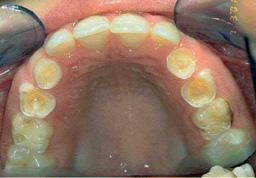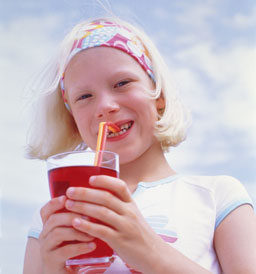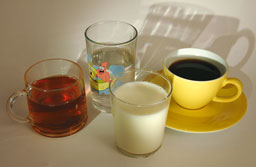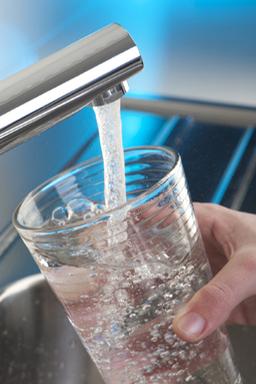Dental erosion, how do you prevent it?
Dental erosion, how do you prevent it?
What is dental erosion?
Cavities (dental caries) are caused by bacteria in the mouth. These mouth bacteria form acid from sugars and other carbohydrates (such as in pasta, potatoes and bread, for example).
This acid causes dental caries. Dental erosion is the dissolution of the surface by acids from food and drink or acid from the stomach. This can soften the surface, which promotes tooth wear.
Dietary habits have changed dramatically in recent years. For example, soft drinks and sports drinks are consumed more often and more often. This can contribute to wear from dental erosion. This leaflet tells you how you can reduce or prevent dental erosion.
The role of erosion in tooth wear
Tooth wear is partly a natural phenomenon, your teeth wear because you use them. This rarely requires treatment. Dental erosion can accelerate tooth wear, which means that a lot of tooth material is lost at a young age. It is important to stop this acceleration.
What does dental erosion look like?
The first signs are generally only visible to the professional. The surface of the teeth or molars can become very slippery. The shape can change. And the teeth can get a slightly yellower color. You usually only notice wear from dental erosion yourself in an advanced stage, when the appearance of the teeth changes. For example, the front teeth become shorter, thinner and more translucent or get ragged edges. Sometimes there are pain complaints, for example when eating and drinking cold or acidic foods.
Often the tooth enamel has completely disappeared and the dentin is exposed. Erosion does not affect the fillings in teeth. This allows the fillings to protrude above the tooth surface

How does tooth erosion cause wear?
Wear and tear due to dental erosion in children is mainly caused by acids from foods. Acids dissolve your teeth. It is not only about how much acidic products you eat and drink, the way you eat and drink is also of influence. For example, do you wait before swallowing until the sting of the drink is gone? Or do you swish a drink around in your mouth for the taste? As a result, the acid is in your mouth longer and that greatly enhances the erosive effect. Stomach acid can also be a cause of dental erosion, especially in adults this often plays an important role. Through vomiting and regurgitation, the stomach acid enters the mouth. The more often this happens, the stronger the erosion occurs.

Saliva neutralizes
Saliva protects your teeth against dental erosion. It neutralizes the acids from food and drinks. Some medications or certain illnesses can inhibit your saliva production. Then you may be extra sensitive to tooth wear due to dental erosion.
Examples of acidic products
soft drinks
Soft drinks get their fresh taste from the added phosphoric acid (for example in cola), citric or malic acid (in all kinds of soft drinks and sports drinks). You won't taste the sour taste because of the added sugar or sweetener. Sugar suppresses the sour taste, but does not neutralize the acid.
Diet soft drinks
Diet soft drinks do not contain sugar, so they do not cause cavities. However, they are usually just as acidic as regular soft drinks and therefore just as dangerous for causing dental erosion.
Fruit juices
Not everyone knows that fruit juices are even more acidic than soft drinks. Fruit juices can therefore also be harmful to your teeth.
Sour fruit
Think of citrus fruits, blackberries and berries, apples, grapes, kiwis and mangos, but also the products thereof (apple syrup, jam).
Acidified foods
Many foods are acidified with acetic acid, such as pickles and onions. All foodstuffs that have been acidified with, for example, acetic or citric acid, also cause dental erosion with frequent use. Consider, for example, salad dressing or mayonnaise.
Safe drinks
Water, coffee (without sugar) and tea (without sugar) and milk are not acidic.
Possible protective products
Milk and yogurt products may have a protective role in the development of dental erosion.
Eating and drinking behavior
Not only the acid of the drinks or foods determines whether damage is done to the teeth. The damage is highly dependent on your eating and drinking behaviour:
- the number of acidic eating and drinking moments per day
- the time you hold an acidic drink in your mouth
- the way of drinking (swishing the soda through the mouth until the 'prick' is almost gone or swishing it around the mouth for the taste
How can you prevent dental erosion?
You can take a number of measures to prevent or limit erosion:
Power supply
Limit acidic drinks and foods. Alternatively, if possible, take water, regular tea (without sugar), coffee (without sugar), or milk. Keep acidic products in your mouth for as short a time as possible. So don't swish the drink around in your mouth. Also, don't suck on sour candy or other acidic products. Limit the number of times you eat or drink. Consume three meals a day and
in addition, no more than four times something in between. Eat acidic fruit no more than once or twice a day. If you drink with your food, that counts as one moment.
Toothbrushing
Brush your teeth twice a day. Use a soft toothbrush and fluoride toothpaste. If there is starting tooth wear, the dentist can advise you a toothpaste or
mouthwash with tin (fluoride or chloride).

Are young people more likely to develop dental erosion than adults?
Young people drink much more often and more soft drinks, sports drinks, other mixed drinks and fruit juices. In addition, dietary habits have changed dramatically. Therefore, young people in particular are more likely to develop dental erosion.
Are diet drinks better for my teeth than regular soft drinks?
Light drinks do not contain sugar, but tooth-friendly sweeteners. But they do contain as much acid as regular soft drinks. They are therefore equally harmful to dental erosion. However, the risk of cavities (caries) is smaller when you drink light drinks.
Buttermilk and yogurt (drinks) are also sour. Why are they not harmful to my teeth?
Buttermilk and yogurt have a high calcium and phosphate content. As a result, hardly any tooth erosion occurs. Milk and yogurt products seem to have a protective role in the
occurrence of dental erosion. But beware of the yogurt drinks that contain sugar and. These can cause cavities.
What is the best thing to give my child to drink?
Your child can drink unlimited water and regular tea (without sugar). Alternatively, you can give milk. Limit the amount of fruit juices and acidic soft drinks or dilute them with water.
